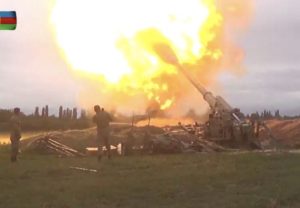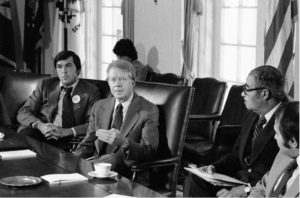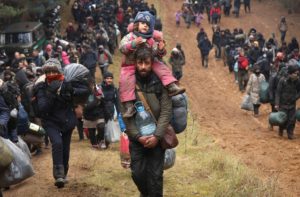Photocourtesy of Getty Images (via The Associated Press).
On March 26, in a live-streamed press conference, Attorney General William Barr and the Justice Department indicted Venezuelan President Nicolás Maduro and fourteen members of his inner circle with charges that range from money laundering and bribery to a narcoterrorism conspiracy with Colombia’s largest rebel group, FARC. Maduro was also alleged to have helped and supervised a drug trafficking organization composed of senior leaders within the Venezuelan military known as the “Cartel de los Soles”, Cartel of the Suns. This is supposedly in reference to the sun-shaped stars that Venezuela’s military officers wear on their uniforms.
“Today’s announcement is focused on rooting out the extensive corruption within the Venezuelan government, a system constructed and controlled to enrich those at the highest levels of the government,” Barr added. Secretary of State Mike Pompeo and the State Department also offered a cash reward of $15 million for Maduro and up to $10 million each for the others.
It still remains to be seen what role, if any, these charges will play in Venezuela’s ongoing presidential crisis and in replacing Maduro with opposition leader Juan Guaidó, who is recognized by most Western and Latin American nations as the country’s acting president. Guaidó, who is still reeling from the failure of his April 2019 uprising, is now assembling a new coalition to not only replace Maduro but to also finance the country’s response to the Coronavirus. However, Maduro and his grip on the nation’s armed forces have always ensured the security of his regime. More than 200,000 Venezuelans took to the streets in 2017 to protest Maduro, before they were violently suppressed by the military, resulting in one hundred deaths. There are worries that this indictment will only lead to a further escalation in violence and no hopes for a negotiable transition, as political consultant Risa Grais-Targow of the Eurasia Group believes: “Maduro’s indictment makes any such negotiation even more unlikely as it materially increases the exit costs for Maduro and other key officials.”
Due to the timing of these charges, there are also concerns about whether this escalation is a legitimate continuation of U.S. anti-drug policies or only a political tool for the Trump administration. There is no doubt that Maduro has some form of connection to the flow of narcotics into the U.S. In 2015, two of his nephews were arrested with 800 kilos of cocaine set to leave on a private plane from Simon Bolivar International Airport in Caracas. However, such an aggressive move by the United States against a head of state has not been seen since the Justice Department’s indictment of Panamanian dictator and general Manuel Noriega in 1988, a dictator who has a complicated relationship with the U.S. The Washington Office on Latin America, a research and advocacy nonprofit for the advancement of human rights in Latin America, also reported that Venezuela is “not a primary transit country for U.S. bound cocaine.” Trump has also verbally bashed America’s staunchest ally in the region, Colombian president Ivan Duque, for his failure to control his country’s drug trade. As Trump stated just last year, “More drugs are coming out of Colombia right now than before he was president, so he has done nothing for us.” U.S. prosecutors have also accused the President of Honduras, Juan Orlando Hernández, with taking drug money, but this did not lead to an announcement from the Department of Justice. Both of these countries continue to receive millions in security aid for their war on narcotics, as opposed to an indictment against their leader. These charges also lend credence to Maduro’s perpetual anti-U.S. rhetoric and his tactic of deflecting his failures onto the United States. On top of blaming U.S. sanctions for Venezuela’s ongoing humanitarian crisis, Maduro blamed a U.S. cyber conspiracy for a record six-day power outage within the country last year. However, I see no reason why it cannot be both: that this recent indictment is a tool by the Trump administration and that the charges of narcoterrorism may be exaggerated, but also that Maduro and his regime are corrupt and responsible for the country’s worsening and dismal conditions, and need to be ousted. Maduro’s decision to disregard the Venezuelan Constitution, National Assembly, and his supreme court’s decision to dissolve the Parliament has delegitimized Maduro’s rule far before these 2020 charges.



